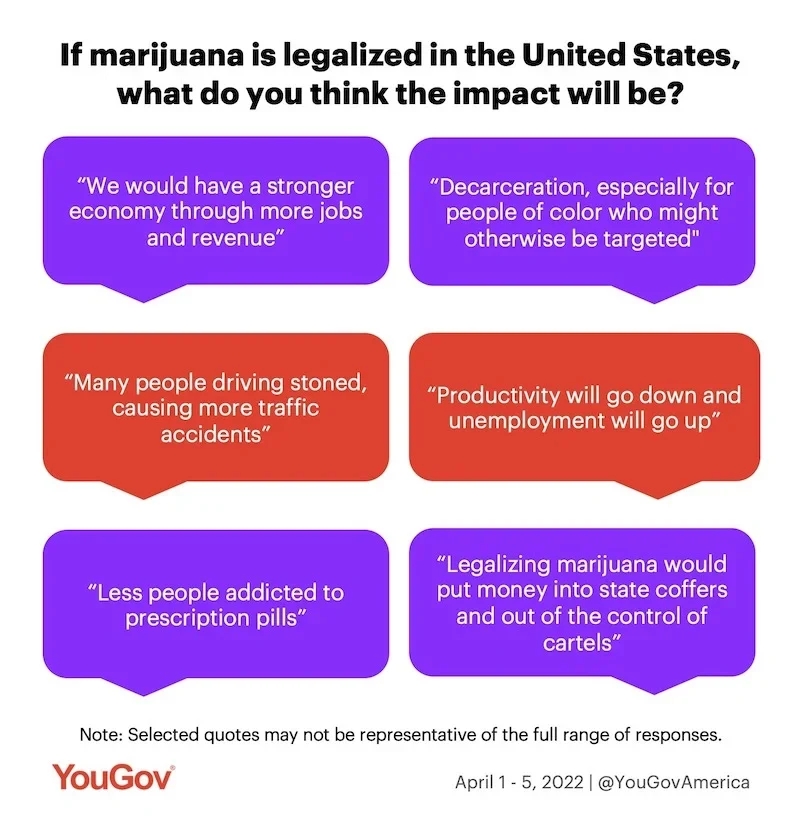
Most Americans say marijuana is safe, can have health benefits, and should be legal
Last week, the U.S. House of Representatives passed legislation that would legalize and tax the sale of marijuana nationwide. The proposed law would also make it possible to expunge previous marijuana-related convictions and would make cannabis-related businesses eligible for loans and other forms of financing. In a recent poll, YouGov finds that a majority of Americans support legalizing marijuana, expunging marijuana-related convictions, and allowing banks to provide services to marijuana businesses.
A majority of Americans – 60% – say that marijuana should be made legal in the United States, while 27% say it should not be. Democrats are far more likely to support (72%) than to oppose (18%) legalizing marijuana. Republicans are evenly split on the issue – 46% support legalizing it and 46% oppose it. Americans who are 65 and older are less likely to support legalization than adults younger than 65, though a majority within each age group analyzed still supports legalization.
Most Americans (57%) support expunging marijuana-related convictions for non-violent offenses, while 22% oppose doing so. About half (51%) support allowing banks to provide financial services to marijuana businesses, while 25% oppose this. Democrats are more likely than Republicans to support each of these measures.
The bill includes a minimum age of 21 for buying recreational cannabis. Our poll asked what the legal age to purchase marijuana should be (providing a few possible responses), and found that Americans who support legalizing marijuana are most likely to say buyers ought to be at least 21 years old (42%), though a sizable share also say 18 (36%).
What do Americans think the impacts of legalizing marijuana would be? When asked this in an open-ended question at the start of the survey, people who were supportive of legalization often predicted increased tax revenue, fewer arrests, lower levels of incarceration, reduced influence of drug cartels, and fewer people addicted to opioids and other prescription pain medications. People who opposed legalization frequently said they expected an increase in impaired driving, decreased productivity, more crime, and an increase in drug addiction.

When asked directly how legalization would impact the economy, half of Americans (50%) say that legalizing marijuana will be good for the U.S. economy, while only 19% say it will be bad. Others say it will have no effect (12%) or are not sure (19%). Nearly three-fourths of Americans (73%) who support legalizing marijuana say doing so will be good for the economy, compared to only 11% of Americans who say it shouldn’t be legal.
Are Americans concerned about the health and safety implications of marijuana legalization? According to our poll, Americans are twice as likely to say marijuana is safe (58% say this) than to say it is unsafe (29% say this). Even more (71%) say they think that marijuana can be useful in treating certain health conditions. This position is more common than the opposing view that marijuana can’t be useful, among both Americans who support legalizing marijuana and legalization opponents.
Compared to when we asked last year, Americans are now 5 percentage points less likely to disagree that marijuana is a “gateway drug,” meaning that for most people who use it, it leads to the use of hard drugs. Nearly half (49%) now say it’s not a gateway drug, compared to 28% who say it is and 24% who are unsure.
When asked whether regular marijuana or regular alcohol use is more harmful to a person’s health, a majority of Americans (58%) say alcohol is more harmful, while only 15% say marijuana. One in five (21%) are unsure and 6% say neither is harmful.
A similar share (59%) say that tobacco is more harmful than marijuana, compared to 14% who say marijuana is more harmful than tobacco.
See the toplines and crosstabs from this U.S. News Poll
Methodology: This U.S. News survey was conducted by YouGov using a nationally representative sample of 1,000 U.S. adult citizens interviewed online from April 1 - 5, 2022. This sample was weighted according to gender, age, race, and education based on the 2018 American Community Survey, conducted by the U.S. Census Bureau, as well as news interest and 2020 Presidential votes (or non-votes). Respondents were selected from YouGov’s opt-in panel to be representative of all U.S. citizens. The margin of error is approximately 4% for the entire sample.
Image: Getty